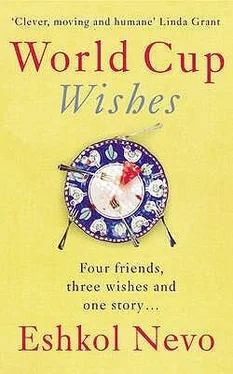Could you shed a bit of light on those circumstances? the presenter in the studio asked.
Not yet, I’m sorry to say, Michaela Raz replied in a voice completely devoid of sorrow. The rumours are spreading like wildfire here and on the Internet, but have not yet been officially confirmed. We hope to get back to you shortly with Alimi’s own response to the affair.
OK, Michaela, we’ll wait patiently for your update, the presenter said, and again turned towards Amichai. Until we hear Mr Alimi’s response, the presenter continued, we’ll go back to Amichai Tanuri and Our Right. Mr Tanuri, don’t you find something distasteful in the fact that half your funding comes from the United States? Isn’t this ultimately what used to be called the ‘looking-for-handouts culture’?
Amichai said nothing. For the first time in any of his media interviews, his vocal chords had dried up. Churchill resigned? he thought, stunned. Why?
CHURCHILL IS THE focus. Even though he’s standing on the side holding a relatively small placard, it’s clear that he’s the focus of the picture. It’s hard to explain. It’s something in his posture. And something in the way the heads of the others at the demonstration lean towards him for guidance or approval. Written in large letters on the placard he’s holding are the words ‘WE ARE ALL SHAHAR COHEN’, my placard says ‘NO SHAHAR COHEN — NO CLASSES’, and the placard Amichai’s holding says, ‘SHAHAR STAYS OR WE GO’. Ofir thought up those slogans, of course. And Amichai’s little sister printed them in her beautiful, round handwriting.
Two days earlier, Shahar Cohen had been expelled from school. There’d been a scuffle during break. Scuffle is too nice a word. It was a fist fight, and Shahar Cohen was involved. He’d also been involved in a copying incident during the Bible final exam. And in a graffiti incident in Arabic. And in the inflated-sex-doll-in-the-headmistress’s-office incident. He hadn’t initiated any of those pranks, but he had the rare talent of joining them at the worst possible moment, when the real initiators could put the blame on ‘the one who came with the integration’ and vanish from the scene. Sometimes it seemed as if Shahar Cohen derived a strange pleasure from always being blamed. As if, instead of fighting the prejudice against ‘the one who came with the integration’, he’d decided to submit to it. To validate it.
Churchill couldn’t stand Shahar Cohen. There was some hidden grudge from the time they were kids growing up in the same neighbourhood. But more than he couldn’t stand Shahar Cohen, he couldn’t abide injustice. And the more he heard about that punching incident during break, the more he suspected that the school governors had taken the easy way out. It turned out that the fight had been started by the son of the president of the school alumni association. And it turned out that he had provoked Shahar Cohen, verbally and physically, for quite a while before Shahar finally punched him. It turned out that he had called Shahar Cohen’s mother a whore, and Shahar a petty criminal. It turned out that his friends had bet secretly that he couldn’t get the petty criminal hiding inside Shahar to come out.
Each one bet fifty shekels.
Those bastards are afraid that his father will cancel his donation for the computer lab, Churchill explained, so they’re putting it all on Shahar. Blaming Shahar is the easiest thing to do, because who’ll defend him?
We’ll defend him! Churchill answered his own question, and dragged all of us to a non-violent demonstration at the school gate.
After standing there for an hour, screaming what was written on the placards to the tunes of football songs till we were hoarse, we moved on to the next stage of Churchill’s plan of action and tied ourselves to the gate with iron chains. I don’t have any pictures of that stage (there was no one to take them, we were all shackled), but the photo in the newspaper clipping I kept shows Churchill stretched out against the gate, and in the corner, there’s a white arm that looks like Amichai’s.
It didn’t take long for the governors to back down. The article in the local newspaper clearly supported our position and printed additional testimonies by students who had been involved in the scuffle. The alumni association held an emergency meeting and decided to set up a committee to study the incident so that such episodes could be avoided in the future, a committee that has not convened to this day. Shahar Cohen was readmitted to school on probation, and thanked Churchill emotionally for all he’d done for him.
It wasn’t for you, it was for the principle of the thing, Churchill said, and added, as cold as iron: don’t think I’ve forgotten what happened, Shahar. Don’t think we’re going to be friends now.
*
None of us knew exactly what had happened. Every time we tried to ask Shahar about it, he cracked a joke. And every time we tried to ask Churchill, he said nothing.
Only years later, on the way back from Mitzpe Ramon, did Churchill tell me. In a quiet voice. Without looking at me even once during the entire drive.
*
Churchill’s father was the handsomest man in Haifa. Even in his forties, Michel Alimi had a full head of carefully combed hair. And greying temples. Impressive. He had very tanned, muscular arms, especially the part you lean on the car window. And he had the smile of a man who knows that his smile is alluring.
He was a driving instructor, and his speciality was married women. From the Carmel. In the mid-eighties, the ‘second-family-car’ rage spread through the wealthiest section of the city, and dozens of women who didn’t have a licence or whose licence had expired, flocked to take lessons with the best instructor in town.
Welcome to my kingdom, he would say at the first lesson and open the door gallantly. Waiting for them inside was a beautifully upholstered seat, air conditioning, and the light scent of aftershave, and in the glove compartment, a box of sweets awaited them: mint and caramel and lemon and the kind that, when you took a small bite, filled your mouth with a warm flow of chocolate.
Sometimes, a boy was also waiting for them in the back seat. The boy’s face was broad and light-skinned, totally unlike the long, dark-skinned face of his father. This is Yoav, my son, Michel would explain to his new students, and they would smile at the boy through the mirror or turn around and shake his hand or turn around and stroke his cheek. Or ignore him completely.
With time, the boy learned that it was actually those women who ignored him — the ones who got into the car determined to show that they had come only to learn how to drive and not for anything else — who were the first to be caught in his father’s net.
It always began with compliments. ‘That colour suits you.’ ‘Your new hairstyle is very flattering.’ ‘Could you please not wear that perfume any more when you come for a lesson? It makes me lose my concentration.’ Then came the touching. Brief, supposedly accidental touches on the elbow or palm. Then more lingering touches: ‘May I? Let’s do it together. Hand on the gearstick, foot on the clutch, and now change gear, gently, not with force, pretend you’re holding something that’s pleasant to the touch, OK?’
Later, just when the atmosphere in the car was beginning to warm up, came the planned outburst of anger: ‘Not like that! What are you doing?! You want to kill us all?!’ He would raise his voice and stop the car with a squeal as he slammed on the instructor’s brake pedal. ‘I’m explaining it to you but you’re not listening. I’m sorry, but if you keep this up, you’ll never pass the test,’ he’d say, putting his tanned hand on his chest, and the woman would leap out of the car at the end of the lesson, upset, sometimes in tears.
Читать дальше












